 MyDogBreeds
MyDogBreeds Both Welsh Springer Spaniel and Scottish Terrier are originated from United Kingdom. Welsh Springer Spaniel may grow 22 cm / 9 inches higher than Scottish Terrier. Welsh Springer Spaniel may weigh 10 kg / 23 pounds more than Scottish Terrier. Both Welsh Springer Spaniel and Scottish Terrier has almost same life span. Both Welsh Springer Spaniel and Scottish Terrier has almost same litter size. Both Welsh Springer Spaniel and Scottish Terrier requires Moderate maintenance.
Both Welsh Springer Spaniel and Scottish Terrier are originated from United Kingdom. Welsh Springer Spaniel may grow 22 cm / 9 inches higher than Scottish Terrier. Welsh Springer Spaniel may weigh 10 kg / 23 pounds more than Scottish Terrier. Both Welsh Springer Spaniel and Scottish Terrier has almost same life span. Both Welsh Springer Spaniel and Scottish Terrier has almost same litter size. Both Welsh Springer Spaniel and Scottish Terrier requires Moderate maintenance.
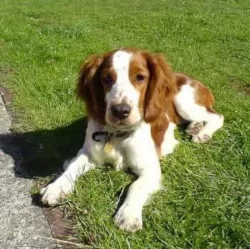 The Welsh Springer Spaniel is thought to be an old Land Spaniel similar to the English Springer Spaniel. They were pretty mush an unknown breed until they won a string of dog trials and became more popular. Following this surge the breed was recognized by the UKC in 1902 and were named the Welsh Springer Spaniel. No one really knows when the breed was developed and cannot be traced because of lack of documentation. They were brought to America in the early 1900’s and were recognized as a breed by the AKC (American Kennel Club) in 1906.
The Welsh Springer Spaniel is thought to be an old Land Spaniel similar to the English Springer Spaniel. They were pretty mush an unknown breed until they won a string of dog trials and became more popular. Following this surge the breed was recognized by the UKC in 1902 and were named the Welsh Springer Spaniel. No one really knows when the breed was developed and cannot be traced because of lack of documentation. They were brought to America in the early 1900’s and were recognized as a breed by the AKC (American Kennel Club) in 1906.
There are images of a dog looking a lot like the Welsh Springer Spaniel in old prints and pictures. The pictures are of a dog known as a Land Spaniel very much like the Welsh Springer Spaniel. These dogs were thought to be preserved by the Welsh and originally called the Welsh Starter. It was a hunting breed working with falcons.
At one point the breed was called the Welsh Spaniel and was also in the UK studbook as a Cocker Spaniel or a Welsh Cocker. There were several different types of Cocker Spaniels including the English Cocker, the Welsh Cocker, the Devonshire Cocker. The Welsh Cocker Spaniel was a solid dark color while the Welsh and Devonshire Cockers were liver colored.
Following World War II there were no dogs left in Wales or anywhere else in the United Kingdom whose parents were registered pedigree. The unregistered dogs were used to restart the breed and these dogs are the ancestors of the modern Welsh Springer Spaniel.
The breed is still rare with only 299 registered in the UK in 2016. They are listed now a vulnerable Native Breed.
 The Scottish Terrier is also known as the Aberdeen Terrier but people who love and know him refer to him fondly as the Scottie.
The Scottish Terrier is also known as the Aberdeen Terrier but people who love and know him refer to him fondly as the Scottie.
These little dogs were originally bred to hunt vermin on farms and their actual origin is ancient. It is believed that the first descriptions of these dogs date way back to 1436 with there being 2 varieties - a rough-haired Scotch Terrier and a smooth-haired English Terrier.
In 1881 the Scottish Terrier Club of England was founded with the Scottish Terrier Club of Scotland being founded in 1888. Scotties were introduced to America in the early 1890s.
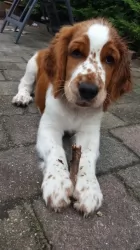 The breed is a medium size, solid and compact dog bred to work. Their forequarters are angled and there hindquarters are well developed. This is a very good looking breed that is only red with white markings. A hard working dog bred to hunt. They are slighter longer than tall and are not penalized as long as the height tis not greater than the length.
The breed is a medium size, solid and compact dog bred to work. Their forequarters are angled and there hindquarters are well developed. This is a very good looking breed that is only red with white markings. A hard working dog bred to hunt. They are slighter longer than tall and are not penalized as long as the height tis not greater than the length.
The tail in docked except in countries where it is illegal to do so. Their eyes should be brown. Noses are black or brown. The ears are small with a fethering like most setters. The show and field styles are the same. They are confused with the Engolish Springer Spaniel even though there are many differences. But both breeds are born to hunt and “spring” at the prey. They are smaller than the English Springer Spaniel and larger than the English Cocker Spaniel.
 The Scottish Terrier is a small dog, fairly robustly built but with short legs. He has a wiry, weather-resistant coat and a soft undercoat. The coat is essentially black but there are other colors too such as a wheaten shade, grey-black and brindle too.
The Scottish Terrier is a small dog, fairly robustly built but with short legs. He has a wiry, weather-resistant coat and a soft undercoat. The coat is essentially black but there are other colors too such as a wheaten shade, grey-black and brindle too.
The ears are erect, the eyes small and bright. The tail isn’t docked but is of medium length and is nearly always held up, without curling over the back.
Height at withers for both males and females should be roughly 23 to 26cm and weight in the region of 8 – 10 kg.
The Scottie is a an independent, robust breed. He is playful as a puppy, but as he matures he becomes more dignified and dour. He is stubborn, but being a terrier he is alert and makes a good watchdog. For a small dog he has a powerful bark.
Brave, loving and loyal, he can fit into life in the city or the countryside so long has he has his human family close by. He doesn’t take kindly to strangers and he he slightly aggressive with other dogs he doesn’t know. He makes a great playmate for children but he certainly doesn’t like being prodded, sat on and poked by small children.
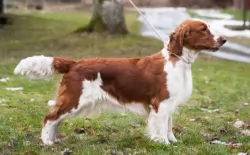 1Children friendliness yes they love their own children, but might be wary of others.
1Children friendliness yes they love their own children, but might be wary of others.
 The Scottie is strong willed and independent, and training and socialization is important if you don’t want your Scottie believing he has the final say.
The Scottie is strong willed and independent, and training and socialization is important if you don’t want your Scottie believing he has the final say.
These dogs are stubborn and dominant and will need a strong, firm but kind owner. They’re aggressive with other dogs, but get on well with their human family.
When you bring one of these distinctive looking dogs into your home, he’ll be a loving, loyal friend.
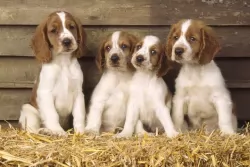 • Eye Diseases – Glaucoma can cause blindness; Entropian – eyelids curl inwards and can damage the cornea.
• Eye Diseases – Glaucoma can cause blindness; Entropian – eyelids curl inwards and can damage the cornea.
 Your Scottie is looked upon as being a generally healthy dog breed, but as with any other healthy dogs, he can succumb to some of the conditions and diseases that dogs get -
Your Scottie is looked upon as being a generally healthy dog breed, but as with any other healthy dogs, he can succumb to some of the conditions and diseases that dogs get -
This is an inherited blood disorder where the blood doesn’t clot properly. The dog will bleed excessively after an injury. Fortunately, while there isn’t a cure, dogs can lead normal lives.
Scottish Terriers are more prone to developing cancer than other dogs. Bladder cancer, lymphosarcoma and malignant melanoma are just some of the cancers they can get. Some cancers are treatable and there is a good success rate in dogs receiving chemotherapy.
When you brush your Scottie, look out for new, unusual lumps that could be indicative of cancer.
Scotty Cramp isn’t serious but uncomfortable for your pet. When your dog becomes worked up, you’ll see him arching his spine and he walks around for a few minutes with a stiff unnatural gait.
Obesity is regarded as a serious disease as it puts strain on the dogs joints and also creates back pain and digestive disorders.
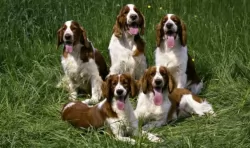 1Feeding the puppy active puppy. Feed breed specific or medium breed high quality dogfood. Feed ½ -3/4 cup in 2-3 meals
1Feeding the puppy active puppy. Feed breed specific or medium breed high quality dogfood. Feed ½ -3/4 cup in 2-3 meals
2.Feeding the adult active breed. Feed breed specific or medium breed high quality dogfood. Feed 1-1/2 cup in 1-2meals
4. Games and Exercises – Needs a secure fenced yard. Loves sports and outdoor activity. Agility, obedience, rally, tracking and loves to run, bike and hike.
 Scotties were once bred as working dogs, and they will certainly require daily exercise and stimulation. He will love a walk but you can’t expect him to run with you as he has short legs.
Scotties were once bred as working dogs, and they will certainly require daily exercise and stimulation. He will love a walk but you can’t expect him to run with you as he has short legs.
The Scottie sheds, so he will need to be brushed at least twice weekly. He will require quite a bit of grooming in terms of having the coat professionally trimmed and clipped.
His eyes and ears will need to be checked as well as his teeth. He can’t tell you if he has terrible toothache and while brushing him, check the teeth. Trim his nails too.
It is always recommended that you feed dogs according to size, age and activity levels. Dogs are individuals and they don’t all need the same food.
The quality of the dog food you provide makes a huge difference on your dog’s health. It always pays to go with the better quality kibble available to dogs. Your Scottish Terrier will be depending on your for quality kibble with the right blend of vitamins and minerals.
Dogs thrive on simplicity and consistency and you want to provide him with some home-made food too that gels well with his digestive system. A little bit of raw meat occasionally can also do him the world of good.
Make sure he always has cool, fresh water to drink.